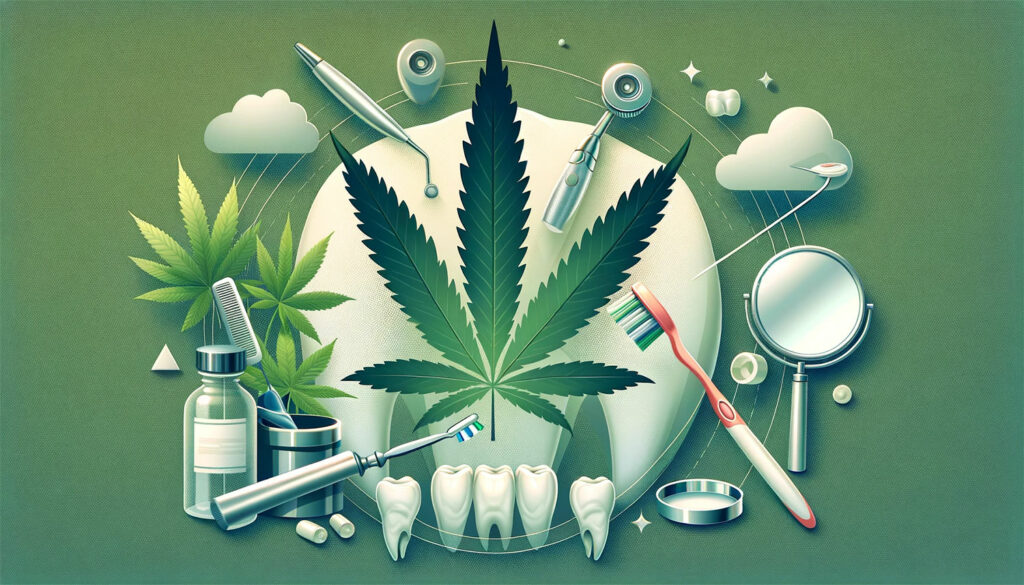This blog aims to educate dental patients on the implications of cannabis use on oral health, offering a blend of scientific insight and practical advice. The information is based on current research and aims to strike a balance between caution and awareness
Introduction
In recent years, the use of cannabis, whether for recreational or medicinal purposes, has seen a dramatic rise, thanks to the liberalization of state laws. For dental care providers and patients alike, understanding the impact of cannabis on oral health has never been more crucial. This blog dives into the effects of cannabis on the oral cavity and offers practical advice for those who partake.
Cannabis: A Brief Overview
Cannabis, scientifically known as Cannabis sativa, is a flowering herb with a complex makeup. Two of its key components are tetrahydrocannabinol (THC) and cannabidiol (CBD). THC is known for its psychoactive effects, commonly experienced in recreational use. CBD, on the other hand, lacks these psychoactive properties and finds widespread use in various forms such as oils, creams, and even beauty products.
Cannabis can be smoked or ingested, with its applications ranging from managing chronic pain, spasticity, and depression, to treating symptoms in HIV/AIDS, cancer, and various psychological disorders.

The Impact of Cannabis on Oral Soft Tissues
Cannabis users should be aware of the potential changes it can cause in the oral cavity. Studies have shown alterations in oral soft tissue in cannabis users compared to non-users. These include changes suggestive of HPV infection and an increased bacterial load. Moreover, cannabis use has been linked to conditions like xerostomia (dry mouth) and inflammation of the uvula.
Oral Cancer and Cannabis Use
The relationship between smoking and oral cancer is well-established. However, the link between cannabis use and oral cancer is less clear. While early studies raised concerns, subsequent research has not consistently shown cannabis to be an independent risk factor for oral squamous cell carcinoma. It is important to note, though, that cannabis might play a contributing role, particularly in conjunction with other risk factors like tobacco use and HPV infection.
Cannabis, Dental Caries, and Periodontal Diseases
The effects of cannabis on dental health extend beyond cancer risks. Evidence suggests an increased risk for both dental caries and periodontal disease among cannabis users. This risk is attributed to factors like reduced saliva production, leading to dry mouth, and potentially due to neglect of oral hygiene.
Periodontal disease, a significant concern for tobacco smokers, also appears to be a risk for cannabis users. Studies point to an association between cannabis use and increased periodontal attachment loss, even after adjusting for other factors like tobacco use and poor oral hygiene. The mechanisms behind this increased risk are still being explored but could be related to the pro-inflammatory effects of cannabis smoke on oral tissues.
Clinical Considerations for Cannabis Users
For dental patients who use cannabis, there are several considerations to keep in mind. First, the interaction between cannabis and dental treatments, particularly local anesthesia, needs careful attention. Studies have suggested that chronic cannabis users might experience differences in the efficacy of local anesthetics.
Furthermore, CBD, a component of marijuana, has been explored for its potential therapeutic applications in oral health. Its antimicrobial properties and possible benefits in conditions like burning mouth syndrome and recurrent aphthous ulcers are under investigation. This highlights the evolving nature of cannabis research in dentistry.
Practical Advice for Cannabis Users
1. Regular Dental Check-ups: Cannabis users should maintain regular dental visits to monitor and address any oral health changes promptly.
2. Oral Hygiene: Maintaining excellent oral hygiene is vital. Brushing twice daily, flossing, and using mouthwash can help mitigate the risk of periodontal disease and caries.
3. Dry Mouth Management: Due to the risk of xerostomia, staying hydrated and possibly using saliva substitutes or stimulants can be beneficial.
4. Candid Conversations with Your Dentist: Be open with your dentist about your cannabis use. This information can help in tailoring your dental care more effectively.
5. Watch for Early Signs: Be vigilant for any signs of oral health issues, such as persistent mouth ulcers, gum inflammation, or unusual oral lesions, and seek prompt dental advice if these occur.
Conclusion
As the landscape of cannabis use evolves, so does our understanding of its impact on oral health. While cannabis has therapeutic benefits for some, it is not without oral health implications. By staying informed, maintaining good oral hygiene, and having open dialogues with dental professionals, cannabis users can better navigate their oral health in this new era.

